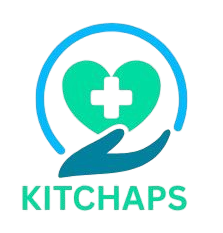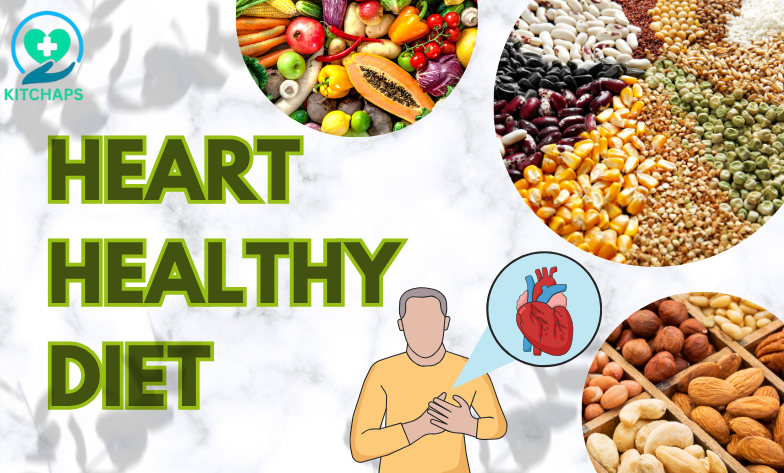Heart Attack is the major cause of death in the world. The full potential of transformation is related to what we eat. The numerous diets available on the internet trigger confusion about what we should eat and avoid. In our mind, many questions arise, such as, can we eat eggs? Is sea salt better to consume? Are the low-fat labels reliable?
This blog will guide you through a healthy diet you should take to prevent a heart attack, food to avoid, supplements, and much more.
Explore Diet Types: Heart Health
There are various types of diets for keeping your heart healthy. But always consult your doctor before starting any kind of dieting. Here are the various diets given below:
Mediterranean Diet: This diet focuses on fruits, vegetables, whole grains, dairy, nuts, etc. It restricts the foods that are processed, red meat, and sugars (added). Many researchers connect eating habits and patterns to reducing the risks of heart attack and stroke. It also emphasizes plant-based oil.
DASH Diet: It stands for Dietary Approaches to Stop Hypertension. DASH is the best diet for keeping your heart healthy because it focuses on green vegetables, fruits, grains, lean proteins, low-fat dairy products, etc. This diet lowers the level of blood pressure and cholesterol, both are the biggest threats of causing a heart attack.
Plant-Based Diets: It includes vegan patterns and emphasizes plant foods only. It restricts animal products. This diet consumes fiber, antioxidants, and some healthy fats, as they are linked with decreasing the level of heart disease. Always take advice from the doctor before taking vitamins B12, iron, as well as omega-3s.
Foods to Eat: A Heart Healthy Diet
Here we will show you what you should eat after a heart attack and for preventing future consequences. This includes:
Fruits and Vegetables
These are full of fiber, antioxidants, vitamins, as well as minerals. It includes carrots, berries, and leafy green vegetables like spinach, tomatoes, and peppers. This lowers the blood pressure and prevents the arteries of your heart. At least eat five portions of fruits and vegetables daily. There are some ways to get your five portions, such as fresh, frozen, dry, watery, and juiced.
Whole Grain, Bread, and Starchy Carbohydrates
Select brown rice, oats, bread rich in wheat, and barley. The grains are rich in fiber, which helps in reducing cholesterol and neutralizes the level of blood sugar. This includes pasta, rice, bread, potatoes, and some other starchy carbohydrates (cereals, porridge, and yams). Vegetables include sweet potatoes, turnips, etc. These foods make up a third of the food we consume.
Always choose whole grains because they contain lots of fiber and vitamins. Consume the fibers more fiber to keep your digestive health fit and healthy because it reduces constipation, heart disease, and type 2 diabetes.
Dairy products
Always go for low-fat dairy products because they reduce the risk of heart attack and cholesterol. Dairy products give you calcium and protein, but they are also related to saturated fat. Products like milk, cheese, yogurt, and others are included, and non-dairy options like soya, oats, and rice. Opt for calcium-based and not sweetened products if possible.
Dairy products like ice cream and butter are not included in your diet because they have high saturated fat. Those products are full of calcium and protein and are good for bones and teeth.
Healthy Proteins
It includes legumes, beans, nuts, fish, seeds, and eggs. These are full of proteins and vitamins, and they are the reliable than meat. You should take two portions of fish per week (oily). Fish like tuna, haddock, and cod. The oily fish include salmon, trout, and sprats.
| Beans and Legumes | Chickpeas, lentils, soy products | Protein and Fiber |
| Seeds and Nuts | Walnuts, flaxseeds, chia seeds, and Almonds | Unsaturated Fat and plant-based omega |
| Fish | Mackerel, Salmon, and Sardines | Lower inflammation and heart disease risk |
Red as well as processed meat, such as sausages and bacon, have a higher risk of heart disease. If you take 6 slices of bacon and 2 sausages, then try to cut them to 70g.
Oils and Healthy Fats
Choose olive, canola, rather than butter, and tropical oils. For the monounsaturated fat, opt for avocados. Because our body requires fat, and the type of food we consume. The unsaturated oils are better than saturated oils, and butter is not included.
Supplements: Do you need them?
The human body operates differently when supplements are consumed. They are taken when your body lacks nutrients from the diet. Take advice from your doctor for the inspection of nutrient levels in your blood. This includes Vitamin D, Vitamin C, all Vitamin B, Vitamin E, Fatty Acids, and magnesium. If you have low levels of nutrients, then you may take supplements after consulting your doctor.
Foods to Avoid: Keeping a Healthy Heart
Some foods are harmful to your body and can trigger heart-related disease. Try to consume in a less quantities the below-mentioned ingredients:
Saturated Fats: Some of the sources are meats, full-fat dairy, butter, and coconut. Consume 10% daily calories. If you have high cholesterol, then 5-6%. Redeem it with unsaturated fats.
Alcohol: If you drink alcohol, then do it in moderation because it increases the risk of heart-related diseases. Try to avoid it, if possible.
Excess Salt: Salts in restaurant meals and processed foods are the sources. Try to consume sodium for less than 2300 mg per day, and people with high BP should consume 1500 mg per day.
Added Sugar: Sugars in sweets, processed foods, and sodas are harmful to your heart. Keep the sugar under 10% of the level.
Heart-Healthy Lifestyle Habits
A healthy diet is good for your health, especially when it comes to heart-related diseases. Apart from a heart-healthy diet, some lifestyle changes should be there:
- Do the exercise daily.
- Manage your Stress.
- Quit Smoking.
- Consume limited alcohol.
- Manage mental health.
Conclusion
Focus on what you eat and what you avoid, because keeping your heart healthy lets you feel energetic. Decorate your plate with colorful fruits, vegetables, and whole grains. Small changes and taking small steps every day make you and your heart healthy.
Disclaimer: This blog is only for knowledge purposes, and it is not expert medical advice. Diets change according to the people, so always consult a dietitian for making changes in your diet, particularly if you have other health conditions.
Frequently Asked Questions (FAQs):
A. No, because different types of salt include the same quantity of sodium, which affects your heart health.
A. No, because your body requires fats, so emphasize unsaturated fats.
A. Take the salt 2300 mg per day, and for people with high blood pressure, 1500 mg.
A. Yes, eat the eggs in moderation, up to 6 eggs per week. If you have high cholesterol, then consult your doctor.

